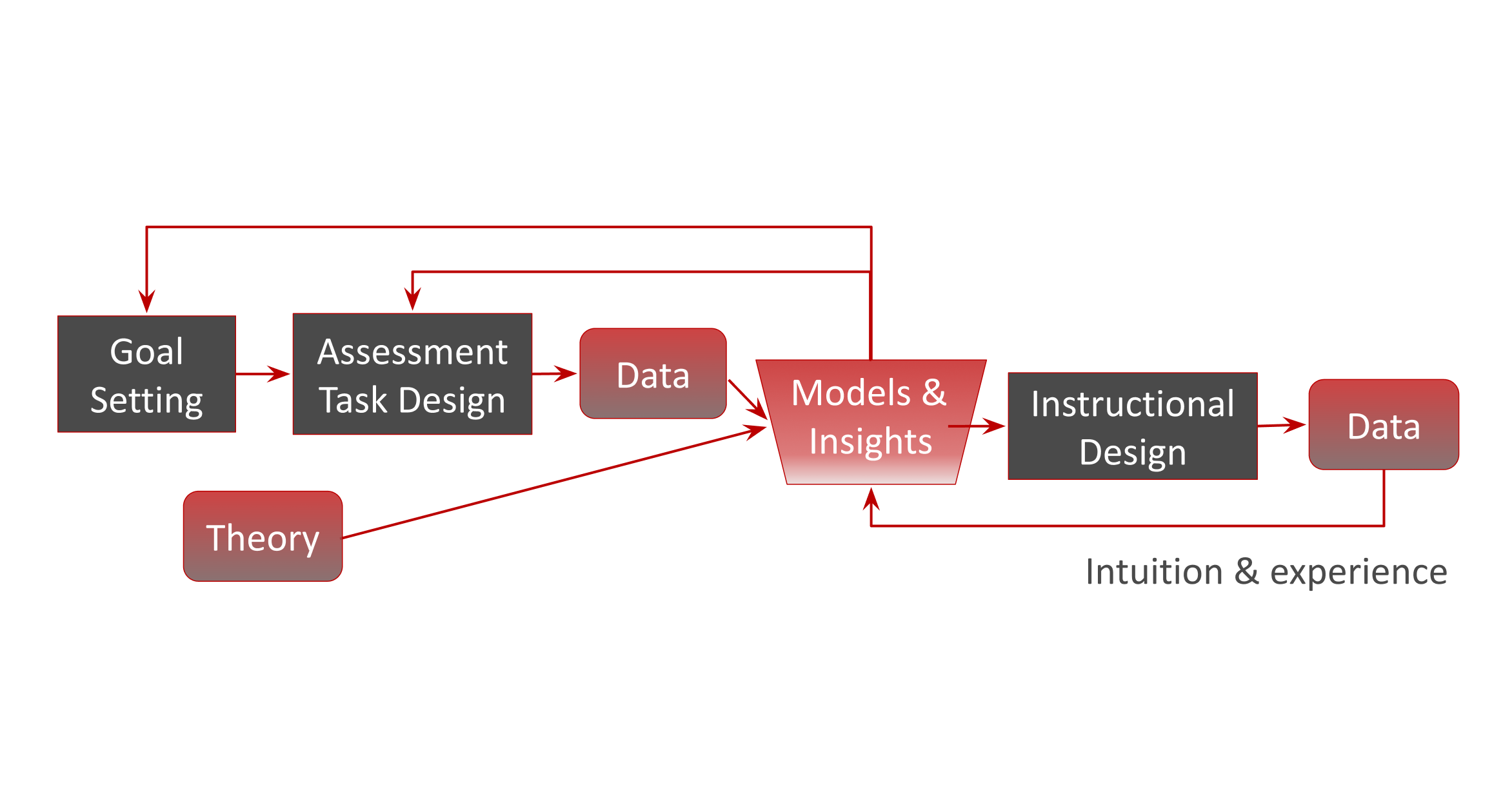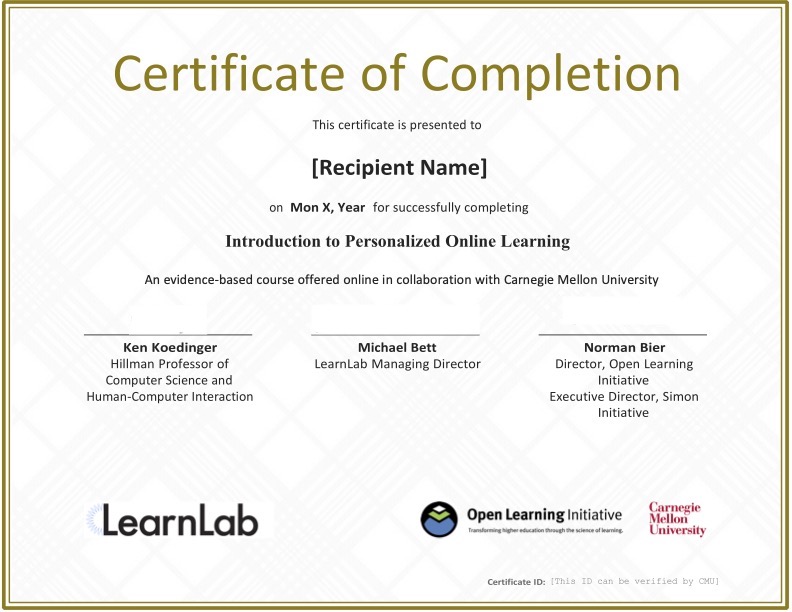Evidence-Based Backward Design


Start Any Time
Work on your pace and you will have instructors available to help you answer any questions.

Duration
Approximately 4 weeks, 6-8 hours/week

Fee
$1000 - Professional Rate
$400 - Full-time Student Rate*
Referral & Group Discounts Available**
*Proof of full time student enrollment required. Acceptable forms of ID include a letter from your university’s registrar office or an unofficial transcript. Email your documents to learnlab-help@lists.andrew.cmu.edu.
**Have you taken one of our courses before? Refer a friend or colleague and get 20% off any future course – they’ll get 20% off a course of their choosing, too! Just have the person you refer email us at learnlab-help@lists.andrew.cmu.edu with your name and email address. Contact us about group discounts.
Certificate Course Description:
Instructional designers employ “backward design”: using scientifically-based principles and practical strategies for aligning the instructional program and its valid assessment with learners and goals. Today’s learning engineers do not simply design in sequence — goals then assessments then instruction — but are agile and iterative. They collect qualitative data, for example, by having an expert “think aloud” while performing one of their assessments and use the results to add or change goals. They collect and use quantitative data, for example, by mining learning data from online course interactions.
In this course, students will learn how to design innovative e-learning, that is, online interactions and technology that make learning more effective and efficient. In the process, students will enhance their ability to read and critique professional articles, synthesize theories, and research findings to design and evaluate the instructional programs based on backward design.
Our team hosts office hours for all courses over Zoom on the 2nd and 4th Wednesday of each month, 10:00 AM – 11:00 AM EDT/EST (4:00 PM – 5:00 PM CAT). On 2nd Wednesdays, Dr. Ken Koedinger, who is the Director of the Masters of Educational Technology and Applied Learning Sciences (METALS) program, will be available. On 4th Wednesdays, you will have the opportunity to speak with our learning engineers.
Module 1: Determining instructional goals; KLI KCs; Blooms taxonomy
- Explain backward design and the interrelationships between goals, assessment, and instruction
- Exemplify using LOGO Debugging by Klahr & Carver
- Map elements of Bloom’s taxonomy to examples
- Exemplify using LOGO Debugging by Klahr & Carver
- Categorize knowledge components along four dimensions
- Explain differences between KLI’s Knowledge Components, Learning Events, Instructional Events, Assessment Events
- Identify key hypotheses of the KLI framework
Module 2: Refining Goals and Introduction to Designing Assessments
- Evaluate and improve goals using KLI, Bloom’s taxonomy, and ABCD
- Apply evidence-based practice
- Explain how KLI and Bloom’s taxonomy fit in the E-Learning Big Picture?
- Compare the purpose of formative and summative assessments
- Recognize the value and limitations of self-assessment
Module 3: Why data toward goal setting improves design & Contextual Inquiry principles
- Explain why knowledge goals must be inferred from models of data
- Recall examples of data leading to new goals
- Recall the goals of Cognitive Task Analysis
- Explain why “if-then” production rules are a good way to express the output (model & insights) of a Cognitive Task Analysis
- Explain and exemplify how Cognitive Task Analysis can be used to identify learning goals
- Explain how Feldon’s goals (for research questions) derive from structured interview CTA guidelines
- Explain how Klahr & Carver’s goals (for debugging) derive from structured interview CTA guidelines
- Recall the four Contextual Inquiry Principles principles and their definitions
- Explain why these principles aid goal specification
Module 4: Online assessment design and implementation
- Evaluate and modify assessment questions based on KLI and Bloom’s taxonomy
- Recognize the variety of assessment authoring tools and salient features (good and not-so-good) of a few
- Implement well-designed assessments online using some assessment authoring tool
Module 5: Course Project
At the end of the course, you’ll have an opportunity to do a little project where you design your own e-learning module. That will provide you with a nice experience to apply the fundamentals you will learn in the modules to a larger, more authentic, context. It will be graded by the instructor and you will receive personalized feedback along with a sample solution.
None
Researchers, product/UX designers, and instructional designers who want to improve e-learning design and design effective instruction. Anyone interested in edtech.
What you'll learn
This course will help you:
- Apply evidence-based backward design and explain the interrelationships between goals, assessment, and instruction
- Evaluate and improve goals using the KLI framework, Bloom’s taxonomy, and ABCD
- Design and implement assessment questions aligned with goals based on KLI and Bloom’s taxonomy using an online assessment authoring tool
- Explain why knowledge goals must be inferred from models of data and how Cognitive Task Analysis can be used to identify learning goals
Course Instructors

Dr. Ken Koedinger
is a professor of Human-Computer Interaction and Psychology at Carnegie Mellon University. Dr. Koedinger has an M.S. in Computer Science, a Ph.D. in Cognitive Psychology, and experience teaching in an urban high school. His multidisciplinary background supports his research goals of understanding human learning and creating educational technologies…
Certificate
Upon successful completion of the program, participants will receive a verified digital certificate of completion from Carnegie Mellon University’s Open Learning Initiative.

In addition to the knowledge and immediately applicable frameworks you will gain by attending your selected courses, you will benefit from:
- A digital, verified version of your Executive Certificate (Smart Certificate) you can add to your resume and LinkedIn
- Networking with a global group of your peers and instructors for advancing your career
Register Now
Register and start taking the course in three steps:
1. Enter your name and email address.
2. Create your account here to access our learning platform.
Have questions? Our learning engineers are here to answer them at our monthly live AMA events! Join us at 4 PM EST on First Fridays, or 10 AM EST on Third Mondays. Registration required.